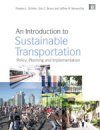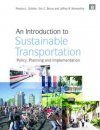![An Introduction to Sustainable Transportation An Introduction to Sustainable Transportation]()
Click to have a closer look
About this book
Contents
Biography
Related titles
About this book
Transportation plays a substantial role in the modern world; it provides tremendous benefits to society, but it also imposes significant economic, social and environmental costs. Sustainable transport planning requires integrating environmental, social, and economic factors in order to develop optimal solutions to our many pressing issues, especially carbon emissions and climate change.
This book reflects a new sustainable transportation planning paradigm. It explores the concepts of sustainable development and sustainable transportation, describes practical techniques for comprehensive evaluation, provides tools for multi-modal transport planning, and presents innovative mobility management solutions to transportation problems.
Contents
1: Introduction and Overview 2: Challenges and Prospects for Sustainable Transportation: Trends and Counter-Trends; Automobile Dependence, Transportation Inequity and the Car Culture. 3: History of Sustainable and Unsustainable Transportation: From Walking to Wheels and Back to Walking. 4: Modes, Roads, and Routes: Technologies, Infrastructure, and Operations 5: Freight, Logistics and Supply Chains: Issues for Sustainability and Transportation. 6: Transportation Economics and Investment 7: Public Policy and Citizen Participation 8: A New Planning Paradigm: From Business As Usual to Sustainable Transportation 9: Exemplary Cities: Vancouver, Portland, Boulder, Freiburg, Seoul, Surubaya 10: Beyond Sustainable Transportation: Repair, Regeneration, Renewal Appendix: Resources and Toolbox Index
Customer Reviews
Biography
Preston L. Schiller, a sociologist by background, is Adjunct Lecturer in the School of Urban and Regional Planning at Queen's University in Kingston, Ontario. He has taught and done research at several universities including the Huxley College of the Environment of Western Washington University and the School of Public Health of the University of North Carolina, Chapel Hill. He has worked on the Washington State and federal Clean Air and Transportation Acts and been involved with numerous governmental transportation policy, planning, and regulatory boards at local, state and regional levels. His publications have aimed at changing public policy and reducing the environmental impacts of transportation. Eric C. Bruun, an engineer and transportation systems expert by profession currently teaches "Manufacturing, Logistics and Transportation" to undergraduate students at the University of Pennsylvania and has also taught public transportation courses there. He is a consultant specializing mostly in the areas of transportation systems and investment analysis and in Intelligent Transportation Systems applied to innovative services for the disabled and to other hard-to-serve transit markets. He is the author of Better Public Transit Systems: Analyzing Investments and Performance (2007) as well as numerous technical reports and journal publications. Eric's teaching and consulting experience includes assignments in numerous countries. Dr Jeffrey Kenworthy is Professor in Sustainable Cities in the Curtin University Sustainability Policy Institute (CUSP) at Curtin University in Perth, Western Australia. Professor Kenworthy teaches courses and supervises postgraduate research students in the area of urban sustainability. He has 30 years experience in urban transport and land use policy with over 200 publications in the field. He is particularly noted for his international comparisons of cities around the theme of reducing automobile dependence.




































